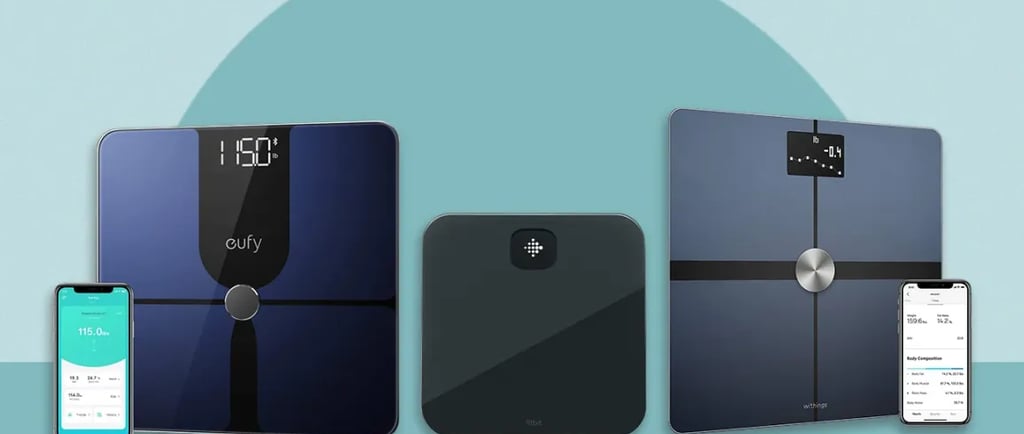Smart Scales: Are They Accurate and Worth the Investment?
Are smart scales accurate—and are they worth it? Learn how these high-tech tools measure body fat, muscle mass, and more, and how to use them effectively to track your fitness goals.
FITNESS GEAR
Vitae List
7/16/20253 min read


Smart Scales: Are They Accurate and Worth the Investment?
Explore the pros, cons, and how to interpret metrics like body fat, muscle mass, and more.
Disclosure: As an Amazon Associate, we earn from qualifying purchases. Some of the links in this post may be affiliate links, which means we may earn a small commission at no extra cost to you.
In the age of wearable fitness tech and health-tracking apps, smart scales have become a popular tool for those who want more than just a number on the screen. These devices promise insights into body composition—measuring everything from body fat percentage to bone mass, hydration levels, and metabolic age.
But how accurate are smart scales really? And are they worth adding to your wellness routine?
Let’s explore how smart scales work, their pros and cons, and how to use the data they provide to support your health goals—without becoming a slave to numbers.
⚙️ How Do Smart Scales Work?
Most smart scales use bioelectrical impedance analysis (BIA) to estimate body composition. This method sends a harmless, low-level electrical current through your body. Because fat, muscle, and water conduct electricity at different rates, the scale uses this data to estimate things like:
Body Fat %
Lean Muscle Mass
Visceral Fat
Bone Mass
Water Retention / Hydration %
Metabolic Age or BMI
Many smart scales sync with fitness apps (like Apple Health, Google Fit, Fitbit, or MyFitnessPal), making it easier to track trends over time.
✅ The Pros of Smart Scales
1. More Than Just Weight
Traditional scales show one number. Smart scales give you context—especially helpful if you’re building muscle or reducing fat without major weight changes.
2. Track Trends Over Time
Seeing changes in body fat %, muscle mass, and hydration levels can provide a clearer picture of your health journey beyond the number on the scale.
3. App Integration
Data can automatically sync to your phone, helping you log progress without manual tracking.
4. Motivation Through Feedback
Smart scales can help reinforce habits when you see progress in different metrics—even when your weight plateaus.
5. Multiple User Profiles
Many smart scales support multiple users, making them a great fit for households with different fitness goals.
⚠️ The Cons (and Limitations)
1. Accuracy Isn’t Perfect
BIA technology can be influenced by hydration, time of day, recent meals, and menstrual cycles. While smart scales are decent for tracking trends, they aren’t medical-grade accurate.
2. Daily Fluctuations Can Be Misleading
Weight and hydration levels naturally fluctuate. Obsessing over small changes can lead to unnecessary stress or disordered habits.
3. Not Ideal for Athletes or Bodybuilders
Because BIA struggles to distinguish dense muscle from fat in some cases, results may underestimate muscle mass or overestimate body fat in fit individuals.
4. Can Create Obsession
More data isn’t always better. For some, frequent tracking can become demotivating or anxiety-inducing.
🔍 How to Get the Most Out of a Smart Scale
✅ Weigh Yourself at the Same Time Daily
First thing in the morning, after using the bathroom and before eating or drinking, offers the most consistent baseline.
✅ Focus on Trends, Not Daily Changes
Weekly or monthly averages are far more useful than day-to-day fluctuations.
✅ Use Smart Scale Data With Other Metrics
Combine with strength gains, sleep quality, energy levels, and how your clothes fit to get the full picture.
✅ Pair With Healthy Habits
Use your smart scale data to help reinforce hydration, nutrition, resistance training, and recovery—not to punish or restrict.
📦 Are Smart Scales Worth It?
If you're:
Curious about your body composition
A fan of wearable tech and tracking
Working on fat loss or muscle gain
Interested in long-term wellness metrics
…then a smart scale can be a valuable and motivating tool.
However, if you:
Tend to over-focus on numbers
Already experience anxiety around weight
Prefer intuitive, feel-based tracking
…it might be better to stick with traditional scales or skip scales altogether and use progress photos, performance markers, or how you feel as guides.
🌟 Final Thoughts
Smart scales can be a helpful layer of feedback, especially when used consistently and with the right expectations. While they’re not perfect, they can show trends that validate your effort, give insight into body composition, and keep you engaged with your fitness journey.
Our recommended scale that we use and find absolutely amazing and an even more affordable price is the Wyze Smart Scale Ultra (in White thank us later). https://amzn.to/4eLobxc
Just remember: Your health is more than numbers. Use smart data to empower, not define, your progress.
